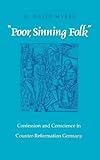"Poor Sinning Folk" : Confession and Conscience in Counter-Reformation Germany / David Myers.
Material type: TextPublisher: Ithaca, NY : Cornell University Press, [2019]Copyright date: ©1996Description: 1 online resource (224 p.) : 6 b&w illustrationsContent type:
TextPublisher: Ithaca, NY : Cornell University Press, [2019]Copyright date: ©1996Description: 1 online resource (224 p.) : 6 b&w illustrationsContent type: - 9781501744709
- 265/.6/094309031
- BX2263.G3M94 1996
- online - DeGruyter
| Item type | Current library | Call number | URL | Status | Notes | Barcode | |
|---|---|---|---|---|---|---|---|
 eBook
eBook
|
Biblioteca "Angelicum" Pont. Univ. S.Tommaso d'Aquino Nuvola online | online - DeGruyter (Browse shelf(Opens below)) | Online access | Not for loan (Accesso limitato) | Accesso per gli utenti autorizzati / Access for authorized users | (dgr)9781501744709 |
Frontmatter -- Contents -- Illustrations -- Acknowledgments -- Introduction -- I. Late-Medieval and Reformation Confession -- II. The Catholic Reformation and Sacramental Confession -- Bibliography -- Index
restricted access online access with authorization star
http://purl.org/coar/access_right/c_16ec
In "Poor, Sinning Folk," W. David Myers investigates the sixteenth-century fate of the medieval Christian sacrament of penance, the process of confessing to a priest in secret one's sins against God and other humans. In Pre-Reformation Germany, numerous layers of public ritual, expectation, and display surrounded the central secret act of confessing and conditioned its meaning. Less frequent and less private than the ritual familiar to modern Catholics, medieval penance was for most German-speaking Christians a seasonal event with social as well as spiritual ramifications for participants. Protestantism swept confession away from many German lands. Even where Catholicism survived and flourished, as in the lands comprising modern Bavaria, the sacrament of penance changed profoundly. The modern confessional booth was introduced, making the sacrament more prominent, more secure from scandal, and ultimately more private. This reform coincided with the efforts of secular rulers to fashion a more disciplined, obedient population. New religious orders, most notably the Society of Jesus in Bavaria, saw the frequent confession of lay people as a means to piety and spiritual discipline amidst the temptations of worldly affairs. By the middle of the seventeenth century, political and religious forces combined to forge the sacrament of penance into an effective instrument of spiritual discipline which would fashion the modern Catholic conscience and endure essentially unchanged into the late twentieth century.
Mode of access: Internet via World Wide Web.
In English.
Description based on online resource; title from PDF title page (publisher's Web site, viewed 02. Mrz 2022)


